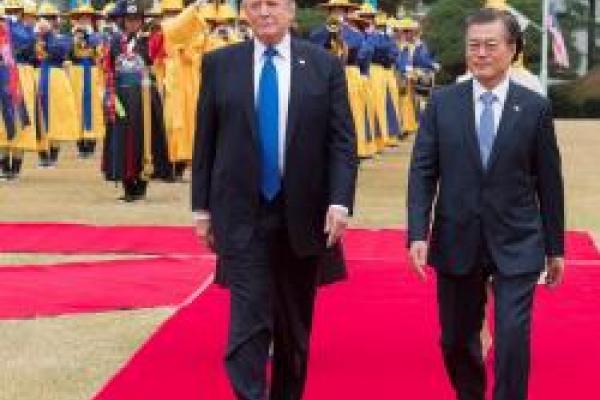
The Mershon Center for International Security Studies and the East Asian Studies Center present a special panel event on:
The United States and East Asia under President Trump: A One-Year Retrospective
Register here for this event
Synopsis
Donald Trump’s election to the presidency unsettled many areas of American foreign policy, but few more than the nation’s relationship with East Asia. From China to Japan to the two Koreas, this region has emerged over the past decades as both a dynamic economic and cultural partner as well as a serious challenge to global stability and American pre-eminence. The list of serious issues that have emerged from East Asia over the past year is long and diverse: North Korea’s nuclear program; the Chinese Belt and Road Initiative; America’s withdrawal from the Trans-Pacific Partnership; the controversies over the THAAD missile system; questions related to cybersecurity, tariff policy, and human rights; territorial disputes in the East and South China Seas; and much more.
Considering the importance of East Asia and the seriousness of the emerging challenges in the area, it is imperative that scholars evaluate the administration’s initial steps and make recommendations for the future. Accordingly, this workshop will offer a one-year retrospective on US-East Asian relations, with presentations by a number of scholars who focus on the region and a subsequent question and answer session.
Participants
David C. Kang is Professor of International Relations and Business at the University of Southern California, with appointments in both the School of International Relations and the Marshall School of Business. He is also director of the Korean Studies Institute and the Center for International Studies. His latest book is "American Grand Strategy and East Asian Security in the 21st Century,"which was published in autumn 2017 by Cambridge University Press. He is also author of "East Asia Before the West: Five Centuries of Trade and Tribute"; "China Rising: Peace, Power, and Order in East Asia"; "Crony Capitalism: Corruption and Development in South Korea and the Philippines"; and "Nuclear North Korea: A Debate on Engagement Strategies" (co-authored with Victor Cha).
Mitchell Lerner is Associate Professor of History and Director of the Institute for Korean Studies at The Ohio State University. He is Associate Editor of the Journal of American-East Asian Relations, serves on the board of advisors of the North Korea International Documentation Project, and has held the Mary Ball Washington Distinguished Fulbright Chair at UC-Dublin. He is the author of The Pueblo Incident: A Spy Ship and the Failure of American Foreign Policy, along with more than15 journal articles, and has edited 3 collections of essays focused on American politics and diplomacy.
James Matray is professor of history at California State University, Chico. He has published more than fifty articles and book chapters on U.S.-Korean relations during and after World War II. His most recent books are Northeast Asia and the Legacy of Harry S. Truman: Japan, China, and the Two Koreas and The Ashgate Research Companion to the Korean War. This coming May, ABC-CLIO will publish Matray’s Crisis in a Divided Korea: A Chronology and Reference Guide. In July 2013, Matray became Editor-in-Chief of the Journal of American-East Asian Relations.
Jennifer M. Miller is an assistant professor of history at Dartmouth College. She received her PhD in the history of U.S. foreign relations from the University of Wisconsin-Madison. A scholar of U.S.-East Asian relations, she is currently finishing a book that examines the impact of American and Japanese understanding of democracy on the development on the U.S.-Japanese relationship between 1945 and 1963. Portions of this project have been published in Diplomatic History and the Journal of Contemporary History. Miller is now starting a second project that examines the economic rise of Northeast Asia between 1970 and 2000 and its impact on American politics, culture, and narratives of political economy.
Meredith Oyen is Associate Professor of History at the University of Baltimore-Maryland County. She specializes in the history of Sino-American relations, focusing her research on the role of migrants, transnational networks, and nongovernmental organizations in bilateral relations in the twentieth century. Before coming to UMBC, she taught for two years at the Johns Hopkins University-Nanjing University Center for Chinese and American Studies. Her book, The Diplomacy of Migration: Transnational Lives and the Making of U.S.-Chinese Relations in the Cold War, was published by Cornell University Press in 2015. She has published articles in Diplomatic History, Journal of Cold War Studies, and Modern Asian Studies. Prof. Oyen served as the first Faculty Veterans Fellow at UMBC in 2015-2016, and participated in an NEH summer institute on Veterans Studies in summer 2016. She also won a 2017 CAHSS Summer Faculty Research Fellowship (SFRF) from the Dresher Center at UMBC for her new project: Shanghai Survivors: World War Two’s Displaced Persons in Asia and the International Politics of Refugee Resettlement.
This event is co-sponsored by the Institute for Chinese Studies, the Institute for Japanese Studies, the Institute for Korean Studies, and a U.S. Department of Education Title VI grant to the East Asian Studies Center at The Ohio State University.
Free and open to the public
Sponsors
Mershon Center for International Security Studies
East Asian Studies Center
Institute for Chinese Studies
Institute for Japanese Studies
Institute for Korean Studies
This event is co-sponsored by the Mershon Center for International Security Studies, the Institute for Chinese Studies, the Institute for Japanese Studies, the Institute for Korean Studies, and a U.S. Department of Education Title VI grant to the East Asian Studies Center at The Ohio State University.
